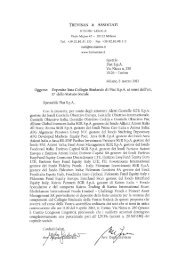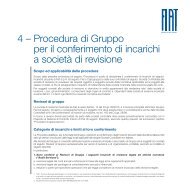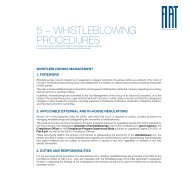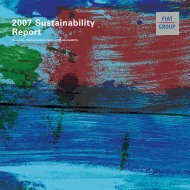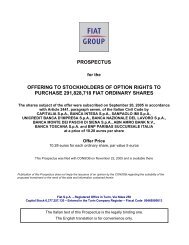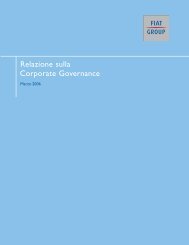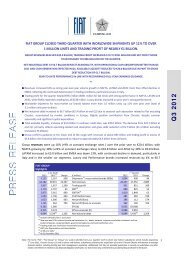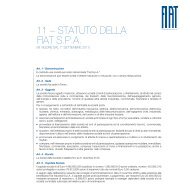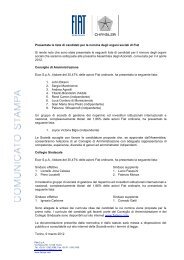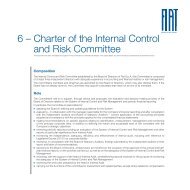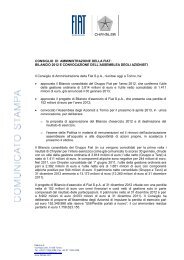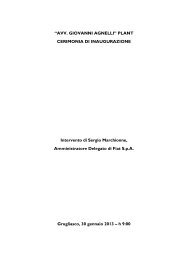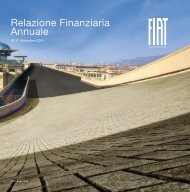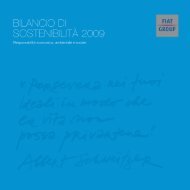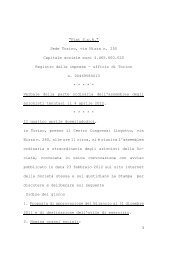annual report - FIAT SpA
annual report - FIAT SpA
annual report - FIAT SpA
You also want an ePaper? Increase the reach of your titles
YUMPU automatically turns print PDFs into web optimized ePapers that Google loves.
Cash-settled share-based payments<br />
Various entities belonging to the former joint venture with General Motors reached agreements with certain employees<br />
in 2001, 2002, 2003 and 2004 over four cash-settled share-based payment schemes entitled Stock Appreciation<br />
Rights (SAR) plans. Under these plans, certain of the employees involved had the right to receive a payment<br />
corresponding to the increase in price between the grant date and the exercise date of Fiat S.p.A. ordinary shares.<br />
The 2001 and 2002 plans have already expired. In accordance with IFRS 2, the Group measures the liability arising<br />
from cash-settled share-based payment transactions at fair value at each <strong>report</strong>ing date and each settlement date; the<br />
changes in the fair value of these liabilities are recognised in the income statement for the period. With reference to<br />
the 70,644 rights outstanding at that date, the liability arising at 31 December 2010 was €0.7million (€0.5 million at<br />
31 December 2009). Moreover, 30,192 rights that were still outstanding at 31 December 2010 were no longer so at<br />
the date of these financial statements following the expiry of the 2003 plan. Finally, as a consequence of the<br />
Demerger, the residual Stock Appreciation Rights were converted to the right to receive a payment corresponding to<br />
the increase in price between the grant date and the exercise date of the sum of the prices of the Fiat S.p.A. and Fiat<br />
Industrial S.p.A. ordinary shares.<br />
24. Provisions for employee benefits<br />
Group companies provide post-employment benefits for their active employees and for retirees, either directly or by<br />
contributing to independently administered funds. The way these benefits are provided varies according to the legal,<br />
fiscal and economic conditions of each country in which the Group operates, the benefits generally being based on<br />
the employees’ remuneration and years of service.<br />
Group companies provide post-employment benefits under defined contribution and/or defined benefit plans.<br />
In the case of defined contribution plans, the Group pays contributions to publicly or privately administered pension<br />
insurance plans on a mandatory, contractual, or voluntary basis. Once the contributions have been paid, the Group<br />
has no further payment obligations. The entity recognise the contribution cost when the employee has rendered his<br />
service and includes this cost by function in Cost of sales, Selling, general and administrative costs and Research and<br />
development costs. In 2010 expenses of this nature included in Profit/(loss) from Continuing Operations totalled €937<br />
million (€984 million in 2009), while those included in Profit/(loss) from Discontinued Operations totalled €443 million<br />
(€396 million in 2009).<br />
Defined benefit plans may be unfunded, or they may be wholly or partly funded by contributions made by an entity,<br />
and sometimes by its employees, into an entity, or fund, that is legally separate from the employer and from which the<br />
employee benefits are paid. Benefits are generally payable under these plans after the completion of employment.<br />
The plans are classified by the Group on the basis of the type of benefit provided as follows: Reserve for Employee<br />
leaving entitlements in Italy (TFR), Pension plans, Health care plans and Other.<br />
Reserve for Employee leaving entitlements in Italy (“TFR”)<br />
The TFR consists of the residual obligation for employee leaving entitlement which was required until 31<br />
December 2006 under Italian legislation to be paid to employees of Italian companies with more than 50 employees<br />
when leaving the company, and accrued over the employee’s working life for other companies. This provision is<br />
settled to retiree employees and may be partially paid in advance if certain conditions are met. This is an unfunded<br />
defined benefit post-employment plan.<br />
Pension plans<br />
The item Pension plans consists principally of the obligations of Group companies operating in the United States<br />
(mainly to those in the CNH – Case New Holland sector) and in the United Kingdom towards certain employees and<br />
former employees of the Group.<br />
Under these plans, a contribution is generally made to a separate fund (trust) which independently administers the<br />
plan assets. The Group’s funding policy is to contribute amounts to the plan equal to the amounts required to satisfy<br />
the minimum funding requirements prescribed by the laws and regulations of each individual country. Prudently, the<br />
Group makes discretionary contributions in addition to the funding requirements. If these funds are overfunded, that is<br />
if they present a surplus compared to the requirements of law, the Group companies concerned could not be required<br />
to contribute to the plan in respect of a minimum performance requirement as long as the fund is in surplus.<br />
The investment strategy for these assets depends on the features of the plan and on the maturity of the obligations.<br />
Typically long-term plan benefit obligations are funded by investing mainly in equity securities, as they are expected to<br />
achieve long-term growth while exceeding inflation; short and medium-term plan benefit obligations are funded by<br />
investing in fixed income securities, which are less volatile.<br />
In the United Kingdom the Group participates amongst others in a plan financed by various entities belonging to the<br />
Group, called the “Fiat Group Pension Scheme”. Under this plan, participating employers make contributions on<br />
Fiat Group Consolidated Financial Statements at 31 December 2010 181



